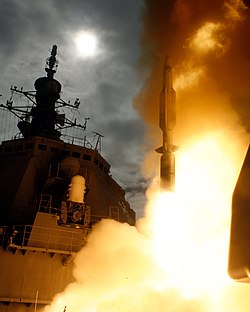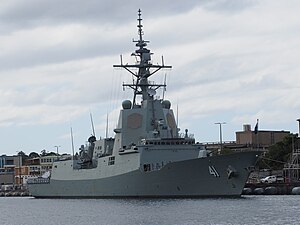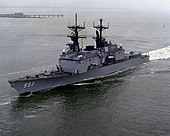
A cruiser is a type of warship. Modern cruisers are generally the largest ships in a fleet after aircraft carriers and amphibious assault ships, and can usually perform several roles.

A carrier battle group (CVBG) is a naval fleet consisting of an aircraft carrier capital ship and its large number of escorts, together defining the group. The CV in CVBG is the United States Navy hull classification code for an aircraft carrier.

In naval terminology, a destroyer is a fast, maneuverable, long-endurance warship intended to escort larger vessels in a fleet, convoy, or carrier battle group and defend them against a wide range of general threats. They were originally conceived in 1885 by Fernando Villaamil for the Spanish Navy as a defense against torpedo boats, and by the time of the Russo-Japanese War in 1904, these "torpedo boat destroyers" (TBDs) were "large, swift, and powerfully armed torpedo boats designed to destroy other torpedo boats". Although the term "destroyer" had been used interchangeably with "TBD" and "torpedo boat destroyer" by navies since 1892, the term "torpedo boat destroyer" had been generally shortened to simply "destroyer" by nearly all navies by the First World War.

A frigate is a type of warship. In different eras, the roles and capabilities of ships classified as frigates have varied somewhat.

The Oliver Hazard Perry class is a class of guided-missile frigates named after U.S. Commodore Oliver Hazard Perry, the hero of the naval Battle of Lake Erie. Also known as the Perry or FFG-7 class, the warships were designed in the United States in the mid-1970s as general-purpose escort vessels inexpensive enough to be bought in large numbers to replace World War II-era destroyers and complement 1960s-era Knox-class frigates.

The Arleigh Burke class of guided-missile destroyers (DDGs) is a United States Navy class of destroyer centered around the Aegis Combat System and the SPY-1D multi-function passive electronically scanned array radar. The class is named for Admiral Arleigh Burke, an American destroyer officer in World War II and later Chief of Naval Operations. With an overall length of 505 to 509.5 feet, displacement ranging from 8,300 to 9,700 tons, and weaponry including over 90 missiles, the Arleigh Burke-class destroyers are larger and more heavily armed than many previous classes of guided-missile cruisers.

The Spruance-class destroyer was developed by the United States to replace the many World War II–built Allen M. Sumner- and Gearing-class destroyers, and was the primary destroyer built for the United States Navy during the 1970s and 1980s. It was named in honor of U.S. Navy Admiral Raymond A. Spruance, who successfully led major naval battles in the Asiatic-Pacific Theater during World War II such as the Battle of Midway and the Battle of the Philippine Sea.

The Charles F. Adams class is a ship class of 29 guided-missile destroyers (DDG) built between 1958 and 1967. Twenty-three were built for the United States Navy, three for the Royal Australian Navy, and three for the West German Bundesmarine. The design of these ships was based on that of Forrest Sherman-class destroyers, but the Charles F. Adams class were the first class designed to serve as guided-missile destroyers. 19 feet (5.8 m) of length was added to the center of the design of the Forrest Sherman class to carry the ASROC launcher. The Charles F. Adams-class were the last steam turbine-powered destroyers built for the U.S. Navy. Starting with the succeeding Spruance-class, all U.S. Navy destroyers have been powered by gas turbines. Some of the U.S. Charles F. Adams class served during the blockade of Cuba in 1962 and during the Vietnam War; those of the Royal Australian Navy served during the Vietnam War and Gulf War.
Four United States Navy ships have been named USS Gridley in honor of Charles Vernon Gridley.

The Ticonderoga class of guided-missile cruisers is a class of warships of the United States Navy, first ordered and authorized in the 1978 fiscal year. It was originally planned as a class of destroyers. However, the increased combat capability offered by the Aegis Combat System and the passive phased array AN/SPY-1 radar, together with the capability of operating as a flagship, were used to justify the change of the classification from DDG to CG shortly before the keels were laid down for Ticonderoga and Yorktown.

The Kidd-class destroyers were a series of four guided-missile destroyers (DDGs) based on the Spruance class. In contrast to their predecessor's focus on anti-submarine warfare, the Kidds were designed as more advanced multipurpose ships with the addition of considerably enhanced anti-aircraft capabilities. Originally ordered for the former Imperial Iranian Navy, the contracts were canceled when the 1979 Iranian Revolution began, and the ships were completed for the United States Navy. They were decommissioned in 1999 and sold to the Republic of China Navy as the Kee Lung class.
The name Mahan was assigned to the following four United States Navy ships, in honor of Rear Admiral Alfred Thayer Mahan, naval historian and theorist on sea power.

The Atago class of guided-missile destroyers in the Japan Maritime Self-Defense Force is a modified version of the Kongō class equipped with the Aegis Combat System.
Trumpeter is a Chinese company that manufactures plastic injection moulded scale model kits. Their product line consists of model ships, aircraft, cars and military ground vehicles. The company is located in Zhongshan, China, just north of Macau. All of the design and development is done at this site and production facilities on site extend to full mold making engineering using spark erosion techniques. The factory has the capacity to take production from computer design right through to packaging with some outsourcing done on things like photo etched parts. Not only are they making models for the Trumpeter label but, under license, also for a number of other brands like Hobby Boss, Mini Hobby and even Fujimi Mokei and Pit-Road.

USS Dewey (DLG-14/DDG-45) was a Farragut-class guided missile destroyer in the United States Navy. She was named in honor of George Dewey, the United States' only Admiral of the Navy. She was the third of four ships whose namesake was Admiral Dewey. The ship's motto was The First and Finest.

The AN/SPY-1 is a United States Navy 3D radar system manufactured by Lockheed Martin. The array is a passive electronically scanned system and a key component of the Aegis Combat System. The system is computer controlled and uses four complementary antennas to provide 360-degree coverage. The system was first installed in 1973 on USS Norton Sound and entered active service in 1983 as the SPY-1A on USS Ticonderoga. The -1A was installed on ships up to CG-58, with the -1B upgrade first installed on USS Princeton in 1986. The upgraded -1B(V) was retrofitted to existing ships from CG-59 up to the last, USS Port Royal.

The Mark 41 Vertical Launching System is a shipborne missile canister launching system which provides a rapid-fire launch capability against hostile threats. The Vertical Launch System (VLS) concept was derived from work on the Aegis Combat System.























